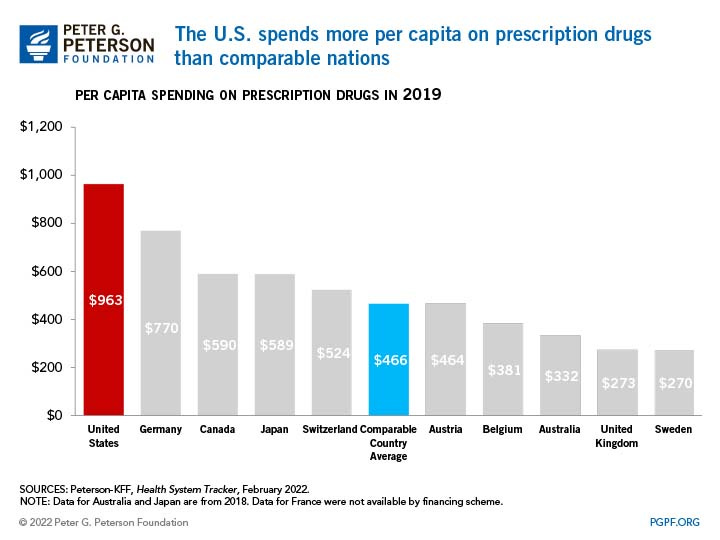Monopoly pricing of drugs causes inefficiencies for the same reason that monopolies usually cause inefficiencies and loss of aggregate welfare. This is well understood by economists. Standard economic theory is that the government should either impose a price cap on monopolists or nationalize them. It should be a slam dunk then to impose a price cap on pharmaceuticals which, due to the patent system are monopolists charging sometimes thousands of times the marginal cost of production. [Also, due to horrendous mismanagement of drug production by both government and business, even some out-of-patent drug producers seem to have monopoly power, but I won’t address that here.]
Nevertheless, defenders of uncapped drug prices argue we should let these high prices in the American market persist because they incentivize and fund research. Now admittedly, Americans are quite rich, but this proposal amounts to sicker Americans being singled out to payin for global drug innovation. A proposal to fund drug innovation for the world via a random tax on some Americans, already marked out by having a disadvantage (illness) would never pass. This system only remains in place because it is the status quo.
There is a better alternative to fund researchers than making disproportionately disabled and vulnerable people pay exorbitant prices for medicine- the prizes, not patents proposal of Joseph Stiglitz.
“Ahh, but it would be difficult to get political backing for the prizes, not patents system. Best not to let the perfect be the enemy of the good.”
Oh well, even if the prizes not patents system proved too hard to implement politically, we could always just greatly subsidise research with some of the resources gained from expanding the pie via making the drug market more efficient.
“Ah, but it would be to difficult to put in place, or sustain, compensatory research funding necessary to make up for the money lost when drug companies could no longer leverage their monopoly position against American consumers.”
Now this is where I get furious.
Anyone who has followed debates about economics recognizes this juncture, but usually we see it in the in the inverse case which works as follows:
Someone proposes a measure that will (putatively) increase efficiency, but in the process redistribute income away from the poor to the rich.
Critics complain about the redistribution to the rich,
The proposer says, usually insincerely “Hey, if we don’t like the redistribution, we can always use government to compensate the losers from the extra riches society generates”.
In other words, the opposite of the drugs case.
Take the law and economics “discipline” as an example. All the time, these sickos are proposing changes to legal rules that will make the poor poorer, but allegedly increase aggregate wealth. All the time, critics say “Hey, your proposal will make things harder for the poor”. And the advocate of law and economics says, with a wink “Hey, I know my proposal enriches the rich, but if that’s a concern we can always make the tax and transfer system more egalitarian to compensate meaning everyone wins”. The critics respond “Yeah, but we both know that won’t happen, so we shouldn’t change the law”. Very, very often the government is persuaded to go ahead with these changes. Seldom is any compensation provided. Call the advocates for efficiency who promise distributive consequences can be fixed up through government action Kaldor-Hicksers.
Except this time the situation is in reverse, the proposal to cut pill prices would redistribute from the rich to the poor and increase efficiency, with the possibility of compensation if desired. But for some reason the Kaldor-Hicksers are not backing it now. They are opposing their own logic the one time, it just so happens that this logic favors taking something away from the shareholder class and then deciding whether to compensate them.
When it’s changing tort law in a way that harms the poor, or ending industry policy all that mattered to the Kaldor-Hicksers was the aggregate sum of compensating variations and a politically implausible promise the windfall could (in theory) be used to help the poor. Suddenly though, when it’s corporate America’s interests on the line, political considerations and feasibility are paramount. Merely theoretical compensation won’t do.






Isn't this contradictory? Either capping drug prices would increase efficiency, or it would decrease innovation in a net negative way, but it can't be both. The net effect on the world has to be either positive or negative, and only if it's positive has efficiency increased.